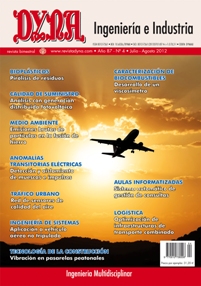AIR QUALITY SENSORS NETWORK FOR A SUSTAINABLE URBAN TRAFFIC MANAGEMENT
Keywords:
contaminación atmosférica, contaminación por tráfico, gestión sostenible del tráfico urbano, sensores de calidad del aire, tráfico urbano, air quality sensors, atmospheric pollution, sustainable urban traffic management, traffic pollution, urban traffic.Abstract
ABSTRACT: Up to now, the main European cities have implemented fixed stations to measure pollution as well as prediction models of future contamination levels across an urban area. Nevertheless, few cities integrate information coming from both sources (i.e. measures and predictions) in order to have an online control of these traffic flows that are originating emergency situations. The Project RESCATAME (Pervasive Air-quality Sensors Network for an Environmental Friendly Urban Traffic Management, www.rescatame.eu) aims to achieve the sustainable management of the traffic by using a pervasive air-quality sensors network as well as prediction models. These sensors are located close to hot-spots and coexist with legacy systems to considerably enhance the monitoring capability across a network. The project ultimate objective is to control the level of pollution, mainly emissions from fuel combustion that affect cities all over Europe. The Pervasive Air-Quality Sensors Network supports Local Authorities to achieve an efficient and sustainable urban traffic management in accordance with the existing environmental policies and legislation. The RESCATAME project will prove that, by using the data collected from the sensors located across the city, providing full time and geographically coverage at low cost, municipalities can efficiently achieve a way of better managing urban traffic in major European cities. Key Words: air quality sensors, atmospheric pollution, sustainable urban traffic management, traffic pollution, urban trafficDownloads
Published
2012-07-01
Issue
Section
ARTICULOS

